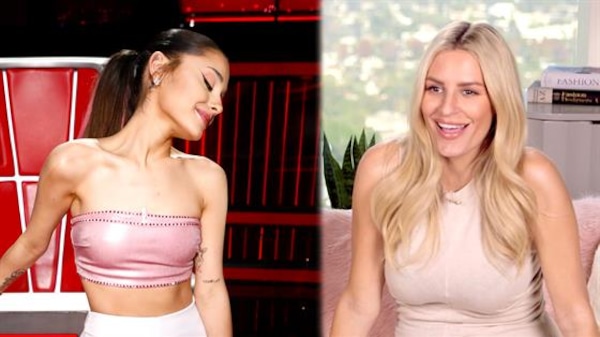
In the ever-evolving landscape of Hollywood, the contributions of women—both on and off the screen—have become a focal point of celebration and advocacy. Among the many voices leading this charge is Ariana Grande, whose influence extends far beyond her chart-topping music and blockbuster films. Grande has consistently used her platform to highlight the importance of uplifting women in the entertainment industry, crediting their talent, resilience, and creativity as foundational to the art form. Her efforts, alongside those of other trailblazing women, are reshaping an industry historically marked by gender disparities and inequities.
Grande’s advocacy for women in Hollywood is perhaps most evident in her collaborations. She has frequently teamed up with female directors, producers, and writers, ensuring their voices are central to her projects. For instance, her music videos and films often feature women in pivotal roles, from choreographers to cinematographers. By doing so, she challenges the notion that women occupy peripheral roles in creative industries. In interviews, Grande has emphasized the importance of “passing the mic” to women, a metaphor for creating opportunities for others to shine. This ethos not only amplifies female talent but also sets a precedent for inclusivity in an industry where women’s contributions have long been undervalued.
One of Grande’s most notable collaborations was with director and producer Jennifer Lee on the film *Don’t Look Up* (2021). Lee, who co-wrote the screenplay and directed the Netflix hit, brought a sharp, satirical edge to the project, and Grande’s performance as a pop star in the film showcased her versatility as an actor. Grande has publicly praised Lee’s vision and leadership, calling her a “genius” and a “force” in the industry. Such public endorsements are more than just compliments—they’re acts of solidarity that validate women’s expertise and push back against the erasure of their achievements.
Beyond her work in film and music, Grande has been a vocal advocate for gender equality in Hollywood’s business practices. She has spoken out about the gender pay gap, a pervasive issue in the entertainment industry where women often earn significantly less than their male counterparts for similar work. In a 2021 interview, Grande highlighted the need for transparency in salary negotiations and called for studios and labels to prioritize equitable pay. Her willingness to address these systemic issues head-on aligns her with a growing movement of women demanding accountability and change.

Grande’s influence also extends to mentoring emerging female artists. She has taken younger stars under her wing, offering guidance and support as they navigate the pressures of fame. For example, she has publicly championed artists like Billie Eilish and Olivia Rodrigo, praising their authenticity and work ethic. By leveraging her own star power to elevate others, Grande embodies the concept of “lifting as you climb,” a philosophy that prioritizes collective advancement over individual success. This approach fosters a culture of support and collaboration, countering the cutthroat individualism often associated with Hollywood.
The impact of Grande’s advocacy is amplified when considered alongside the efforts of other women in Hollywood. Directors like Ava DuVernay and Greta Gerwig have long fought for representation behind the camera, while actors like Reese Witherspoon and Issa Rae have built media empires that center female stories. Together, these women form a network of allies who challenge systemic barriers and redefine what success looks like in the industry. Grande’s role in this ecosystem is both a product of and a contribution to this broader cultural shift.
However, the path to gender equity in Hollywood remains fraught with challenges. Despite progress, women continue to face obstacles in securing leading roles, directorial opportunities, and equitable compensation. Grande has acknowledged these hurdles, using her platform to call for systemic change. In a 2022 speech at a women’s empowerment event, she emphasized the importance of “showing up” for one another, even in the face of setbacks. Her message resonated with many, underscoring the need for persistence and unity in the fight for equality.
Grande’s advocacy also intersects with her work as a producer. Through her production company, R.E.M. Beauty, she has greenlit projects that center female narratives, from documentaries about women’s rights to comedies written by and for women. By controlling the creative process, she ensures that stories about women are told with authenticity and depth, free from the male gaze that has historically dominated Hollywood. This approach not only diversifies the types of stories being told but also creates opportunities for women in writing, directing, and producing.
The ripple effect of Grande’s efforts is evident in the rising visibility of women in Hollywood. Young actresses and filmmakers now have more role models than ever, and audiences are increasingly demanding stories that reflect diverse experiences. Films like *Barbie* (2023), directed by Gerwig, and *Promising Young Woman* (2020), directed by Emerald Fennell, exemplify the cultural shift toward centering women’s voices. Grande’s support for such projects—whether through social media endorsements or financial backing—helps sustain this momentum.
Critics might argue that celebrity advocacy alone cannot dismantle systemic inequities. And while Grande’s influence is significant, it is part of a larger, collective effort. The women she credits—from veteran actresses to emerging filmmakers—each play a role in challenging the status quo. By acknowledging their contributions publicly, Grande helps shift the narrative from one of individual heroism to one of communal progress. This reframing is crucial, as it emphasizes that gender equity is not the responsibility of a single person but a shared goal requiring sustained effort.
Looking ahead, Grande’s legacy in Hollywood will likely be defined not just by her artistic achievements but by her commitment to empowering others. As she continues to use her platform to credit and uplift women, she sets a standard for what it means to be a leader in the industry. Her actions challenge future generations to prioritize collaboration over competition and to recognize that true success is measured not by personal accolades but by the communities we build along the way.
In a world where women’s voices have been marginalized for too long, Ariana Grande and her peers are rewriting the script. By celebrating the talent, resilience, and creativity of women in Hollywood, they are not only honoring the past but also paving the way for a more inclusive future. Their work reminds us that progress is not a solitary endeavor but a collective triumph—one that requires courage, solidarity, and an unwavering belief in the power of women to shape the world.














